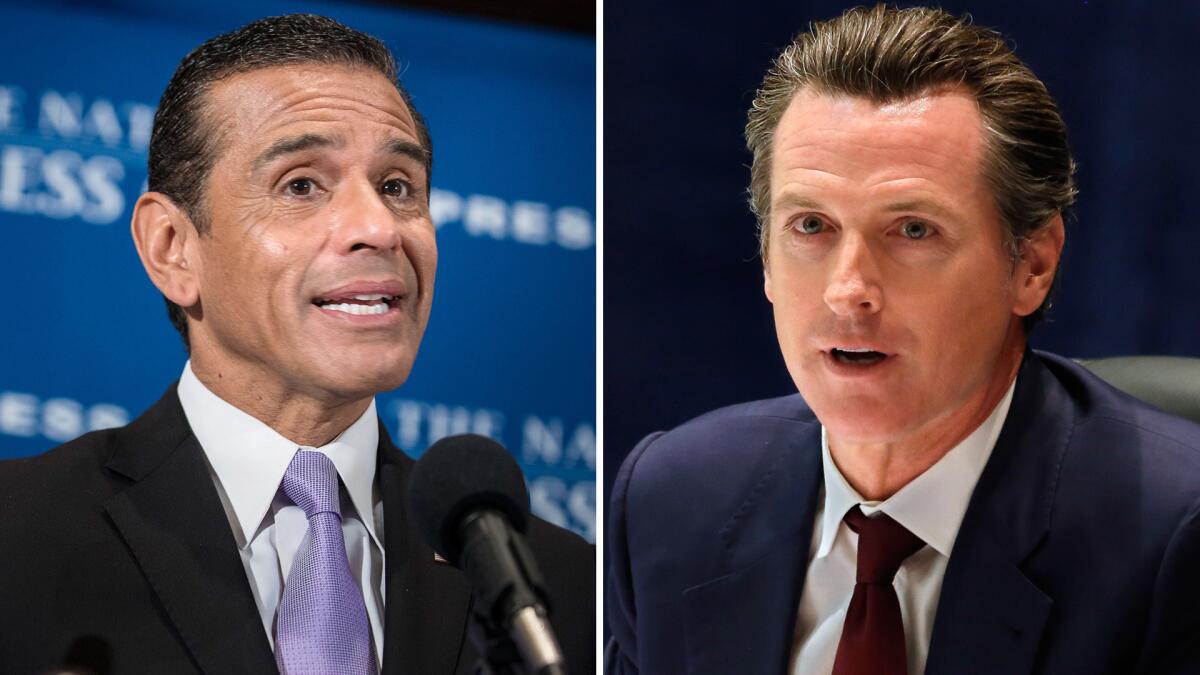Capitol Journal: Five things we already know about California’s races for governor and U.S. Senate

- Share via
Reporting from Sacramento — It’s still early in the 2018 races for California governor and U.S. Senate, but already we know five things:
— In this stormy, polarized political climate, Republicans aren’t likely to vote for a Democrat even if there isn’t a strong GOP candidate on the ballot.
— So the original theory behind Democratic state Treasurer John Chiang’s candidacy for governor that he could attract business-minded Republicans just isn’t working out.
— Democratic state Senate leader Kevin de León’s challenge of centrist U.S. Sen. Dianne Feinstein is drawing some GOP support, but that can’t last if Republicans ever learn about the tenacious liberal.
— Democratic Lt. Gov. Gavin Newsom always has been the front-runner for governor and still is, but former Los Angeles Mayor Antonio Villaraigosa is inching up and making the race competitive.
— Feinstein is running far ahead in her bid for a fifth full term as the relatively unknown, underfunded De León’s attempt to attract “Berniecrats” falls flat.
The June 5 primary election will select the top two vote getters in each race, regardless of party, and advance them to a Nov. 6 runoff.
What we know now comes from public opinion polls. The most recent one was released Nov. 30 by the nonpartisan Public Policy Institute of California.
It showed that among likely voters, Newsom led the gubernatorial contest with 23%, followed by Villaraigosa at 18%. Then came Chiang and Republican businessman John Cox, both at 9%. After that was Republican Assemblyman Travis Allen of Huntington Beach, 6%, and Democratic former state schools chief Delaine Eastin, 3%. Nearly a third of the likely voters hadn’t decided.
In the Senate race, Feinstein was outrunning fellow Democrat De León by 45% to 21%. A third were undecided.
A month earlier, a USC Dornsife/Los Angeles Times poll found Newsom leading Villaraigosa by 10 percentage points.
Chiang’s camp disputes the PPIC findings, saying its own private poll in October used a narrower, more realistic definition of a likely voter. And in that survey, Chiang trailed Villaraigosa by only 2 points. But Newsom had an even larger lead, 14 points.
The public polls are neutral and accessible, so I go with them.
What stood out in the PPIC survey was Villaraigosa creeping up on Newsom. Villaraigosa, 64, is also a former Assembly speaker and Newsom, 50, made his political name as San Francisco mayor.
Villaraigosa’s hopes largely depend on whether Latinos finally turn out to vote in decent numbers. They’ve been under-voting in California for decades. But President Trump’s determination to build a border wall and escalate the deportation of immigrants without documentation affects relatives and friends of many unnerved Latino citizens. And they just might be motivated to vote next year.
There’ll also be Latinos running in most other statewide races.
Villaraigosa would be the first Latino in history to be elected California governor. One Latino, Romualdo Pacheco, served for a few months in 1875 after ascending from lieutenant governor when the governor, Newton Booth, was elected to the U.S. Senate.
In the PPIC poll, Latinos favored Villaraigosa over Newsom by 42% to 11%.
Latinos weren’t helping De León much in the Senate race, however. They backed Feinstein 48% to 26%. Nearly half of Latino voters drew a blank on De León.
“The challenge for De León is the fact that although he has held a very powerful position in Sacramento, voters say they’ve never heard of him,” says Mark Baldassare, the PPIC president and pollster. “How do you get known in this climate?”
With money. And De León doesn’t have much. Feinstein can raise tons.
But De León is getting a boost from Republicans — no doubt because his name isn’t Feinstein, a decades-long GOP nemesis. And there aren’t any GOP candidates running for the Senate. Republicans favored De León over Feinstein in the poll by 25% to 18%. But Democrats supported the incumbent senator by 66% to 16%.
Republicans presumably will flee De León once they realize he pushed through “sanctuary state” legislation and has promoted other liberal bills such as tough gun control and state single-payer health insurance.
Those leftist efforts, however, aren’t attracting “Berniecrats.” Liberals favored Feinstein 57% to 20%.
In the gubernatorial race, Chiang — selling himself as a good money manager — was supported by only 2% of Republicans. Nearly half of Republicans backed the obscure GOP candidates. And more than a third were undecided.
It could be that the soft-spoken Chiang, 55, lacks the oratorical flair sought by today’s agitated voters who are attracted to firebrands.
But in this era, Republicans really dislike most Democrats. And vice versa. The PPIC poll showed that 91% of Republicans have an unfavorable impression of the Democratic Party. And 92% of Democrats feel that way about the GOP.
Baldassare found little public interest in the gubernatorial race, compared with the last time the office was being vacated in 2010. Only 25% of likely voters were paying attention to who might succeed Gov. Jerry Brown. But 43% were following the race when Brown ran for his third term.
“Their attention has been diverted to Washington,” the pollster says.
He also wonders whether voters will be turned off from voting by all the sexual harassment scandals in politics.
I don’t know about that. But I do think it will be even tougher than usual for little-known candidates to be heard over all the roaring from Washington and accusations of sexual misbehavior.
Coverage of California politics »
Follow @LATimesSkelton on Twitter
ALSO
Why you should believe women in politics who speak out about sexual misconduct
Where’s your money really going when you donate to charity? Do your research
More to Read
Get the L.A. Times Politics newsletter
Deeply reported insights into legislation, politics and policy from Sacramento, Washington and beyond. In your inbox twice per week.
You may occasionally receive promotional content from the Los Angeles Times.











